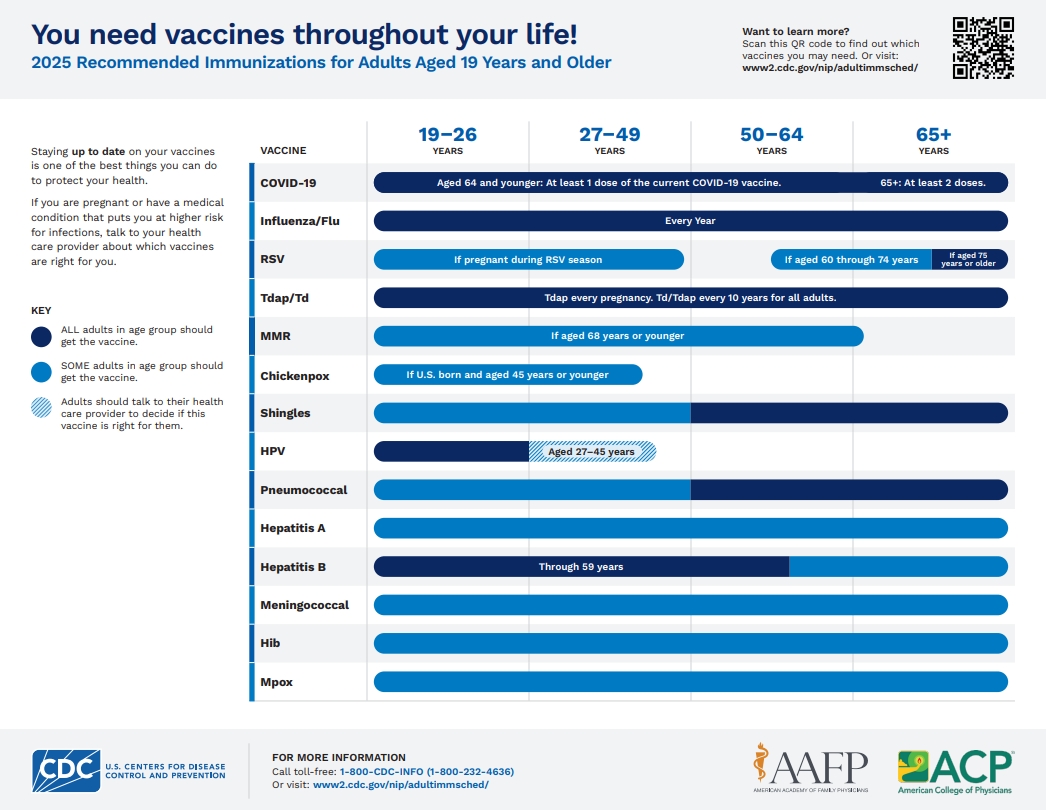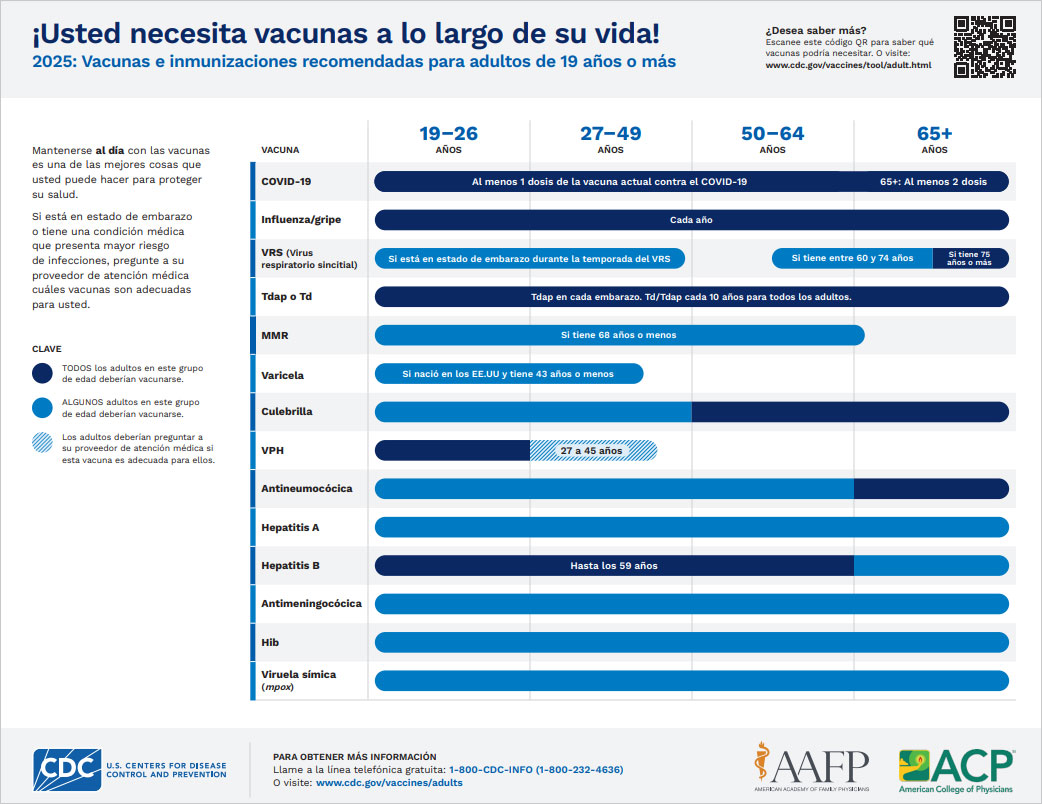Key points
Getting vaccinated is one of the safest ways for you to protect your health. Vaccines help prevent getting and spreading serious diseases that could result in poor health, missed work, medical bills, and not being able to care for family.
All adults need these routine vaccines
Everyone should make sure they're up to date on these routine vaccines:
- COVID-19 vaccine
- Flu vaccine (influenza)
- Tdap vaccine (tetanus, diphtheria, and whooping cough) or Td vaccine (tetanus, diphtheria)
You may need other vaccines, too
Review the sections below to learn what other vaccines you may need based on:
- Age
- Life events, job, or travel
- Health conditions
Recommended vaccine schedule for adults
Life Events, Job, and Travel
Pregnancy
Get the whooping cough vaccine during each pregnancy
- Tdap vaccine — between 27 and 36 weeks of pregnancy to help protect your baby against whooping cough
Make sure you're up to date on other vaccines, too
- COVID-19 vaccine
- Flu vaccine especially if you're pregnant during flu season, which is October through May
- Hepatitis B vaccine
Talk with your ob-gyn or midwife to find out which vaccines are recommended to help protect you and your baby. Learn more about Pregnancy and Vaccination.
Healthcare workers
Vaccines you need
If you work directly with patients or handle material that could spread infection, you should get appropriate vaccines to reduce the chance that you will get or spread vaccine-preventable diseases. All healthcare workers should make sure they're up to date on these vaccines:
- COVID-19 vaccine
- Chickenpox vaccine (varicella)
- Flu vaccine
- Hepatitis B vaccine
- Meningococcal vaccine – especially lab workers who work with Neisseria Meningitidis
- MMR vaccine (measles, mumps, and rubella)
- Tdap or Td
International travelers
Get vaccinated before you travel
The vaccines recommended or required for an international traveler depend on several factors, including age, health, and itinerary.
Take these steps to make sure you are prepared for your trip:
- Make sure you are up-to-date with all recommended vaccines. Talk with your healthcare provider and get any vaccines that you may have missed.
- Learn the recommended and required vaccines for your destination. Visit Travelers' Health: Destinations for more information about recommendations and requirements for the locations you will be visiting during your travel.
- Get vaccinated at least 4 to 6 weeks before your trip. Planning ahead will give you enough time to build up immunity and get best protection.
Find a travel clinic: Many state and local health departments provide travel vaccinations. Get more travel vaccination information as well as where to find travel vaccinations at CDC's Travelers' Health Clinic page.
Immigrants, refugees and international adoptions
Immigrants
Whether you are applying for an immigrant visa overseas or for legal permanent residence within the United States, you need to meet the vaccination criteria for U.S. immigration.
Refugees
Refugees are not required to have vaccinations before arrival in the United States, but you can start getting certain vaccinations through the vaccination program for U.S.-bound refugees.
International adoptions
- Adoptees 10 years of age and under: Immigration law allows for adoptive parents to sign an affidavit stating they will be vaccinated after arrival to the United States.
- Adoptees over 10 years of age: Immigration law requires proof of vaccination during the overseas medical examination.
- Parents or close contacts traveling internationally to adopt a child: Make sure you are fully vaccinated according to CDC's ACIP recommendations. Some vaccine-preventable diseases, such as hepatitis A, are more common in other countries than the United States.
- Get more international adoption health guidance.
Health Conditions
Asplenia (without a functioning spleen)
Vaccines are especially critical for people with chronic health conditions such as asplenia to protect them from vaccine-preventable diseases. Make sure you're up to date on these vaccines:
- Hib vaccine (Haemophilus influenzae type b)
- Meningococcal vaccines – both MenACWY and MenB
- Pneumococcal vaccine
Diabetes, type 1 and type 2
People with diabetes (both type 1 and type 2) are at higher risk for serious problems, including hospitalization or death, from certain vaccine-preventable diseases. Vaccines are one of the safest ways for you to protect your health, even if you are taking prescription medications. Make sure you're up to date on this vaccine:
Heart disease, stroke or other cardiovascular diseases
People with heart disease and those who have suffered stroke are at higher risk for serious problems or complications from certain vaccine preventable diseases. Other vaccine-preventable diseases, like the flu, can even increase the risk of another heart attack. Make sure you're up to date on this vaccine:
HIV infection
Vaccines are especially critical for people with chronic health conditions such as HIV infection. Vaccine recommendations may differ based on CD4 count. Make sure you're up to date on these vaccines:
- Hepatitis A vaccine
- Hepatitis B vaccine
- Meningococcal conjugate vaccine (MenACWY)
- Pneumococcal vaccine
- Shingles vaccine
If your CD4 count is 200 or greater: AIn addition to the vaccines listed above, you may need these vaccines:
- Chickenpox vaccine – recommended for all adults born in 1980 or later
- MMR vaccine – recommended for all adults born in 1957 or later
Liver disease
Vaccines are especially critical for people with health conditions such as liver disease. Getting vaccinated is one of the safest ways for you to protect your health, even if you are taking prescription medications for liver disease. Make sure you're up to date on these vaccines:
Lung disease (Including Asthma or COPD)
People with lung disease (including asthma or COPD) are at higher risk for serious problems, including hospitalization or death, from certain vaccine-preventable diseases. Getting vaccinated is one of the safest ways for you to protect your health, even if you are taking prescription medications for your condition. Make sure you're up to date on this vaccine:
End-stage renal (kidney) disease
Getting vaccinated is one of the safest ways for you to protect your health, even if you are taking prescription medications for end-stage renal (kidney) disease or on hemodialysis. Make sure you're up to date on these vaccines:
Weakened immune system (excluding HIV infection)
Vaccines you need
Vaccines are especially critical for people with a weakened immune system from diseases such as cancer or patients taking immunosuppressive drugs. Having a weakened immune system means that it is more difficult to fight off infections or diseases in the body. Adults with weakened immune systems caused by immunocompromising conditions such as cancer should make sure they're up to date on these vaccines:
- Hib vaccine – Recommended for adults with complement deficiency, which is a specific type of immune deficiency, and for adults who have received a hematopoietic stem cell transplant (HSCT, or a bone marrow transplant)
- Pneumococcal vaccines
- Meningococcal vaccines (MenACWY and MenB) – Recommended for adults with complement deficiency, which is a specific type of immune deficiency
- Shingles vaccine
You may need other vaccines, too
You may need other vaccines based on your age or other factors, too. Talk with your doctor to find out which vaccines are recommended for you. These may include:
- Chickenpox vaccine – recommended for all adults born in 1980 or later
- Hepatitis B vaccine – recommended for all adults up through 59 years of age, and for some adults 60 years of age and older with known risk factors
- HPV vaccine – recommended for all adults up through 26 years of age, and for some adults aged 27 through 45 years
- MMR vaccine – recommended for all adults born in 1957 or later
- Shingles vaccine – recommended for all adults 50 years of age and older
- If CD4 percentages are available, CD4 percentage should be 15% or greater.


